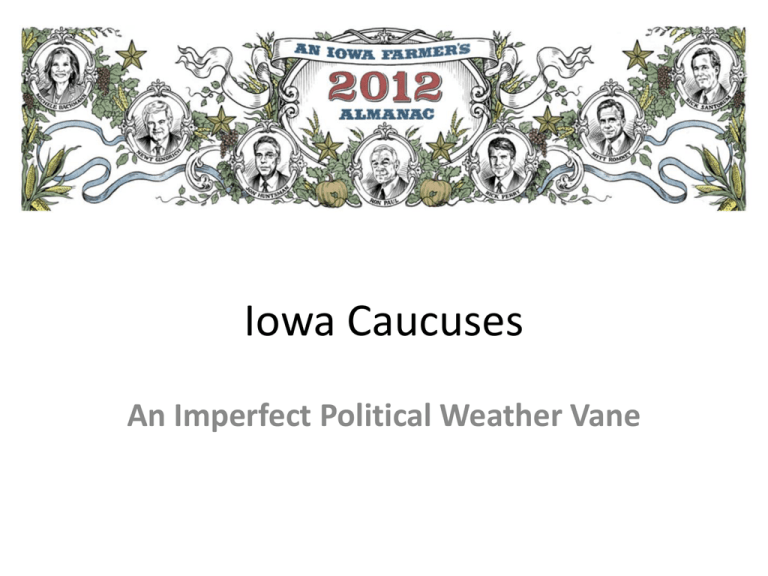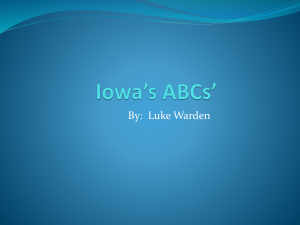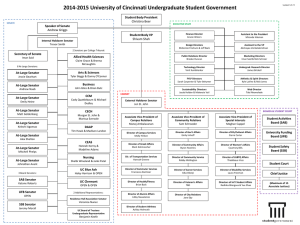Iowa Caucuses
advertisement

Iowa Caucuses An Imperfect Political Weather Vane • “If the Iowa caucuses meant anything, we’d all be talking about President Gephardt.” — unidentified “county courthouse pundit.” • “Can I shovel your walk for you?” — Former Gov. Howard Dean of Vermont, putting an arm around an undecided voter at a diner in 2004. • Pollster before the 1984 caucuses: “Are you supporting John Glenn for president?” Mary Grandon, poll respondent: “I don’t know. I haven’t met him yet.” Timeline: How Iowa Rose to Prominence • • • • 1846: The fix is in Party insiders in the soon-to-be state of Iowa control the selection of national delegates through a system of springtime caucuses. 1968: Disgust over the “smoke-filled room” After President Lyndon B. Johnson declines to run and Senator Robert F. Kennedy of New York is assassinated, Vice President Hubert H. Humphrey is nominated without competing in the primaries, at a Democratic convention in Chicago marred by violent anti-Vietnam War protests. 1972: First in the nation The debacle of 1968 prompts a Democratic reform effort co-led by Senator George McGovern of South Dakota. Iowa adopts a more open caucus process starting in January, before even the first primary, New Hampshire’s. Senator McGovern exploits the rules he rewrote. He beats expectations, behind “uncommitted” and Senator Edmund S. Muskie of Maine, and goes on to win the nomination. 1976: Jimmy who? Former Gov. Jimmy Carter of Georgia bests more than a dozen Democratic rivals (though also behind “uncommitted”) in a low-key campaign of homespun doggedness in which he makes meatloaf on a local talk show. Iowa Republicans move their caucus to the same early date as that of Democrats to share the media’s growing attention. Timeline: How Iowa Rose to Prominence • 1980: “Big mo” The front-runner, Ronald Reagan, takes Iowa for granted and George Bush wins. Mr. Bush claims “big mo,” or momentum, but that helps him win only the No. 2 spot on the eventually victorious Reagan ticket. • 1984: More mo The Democrats shorten the time between Iowa and New Hampshire from a month to a week, increasing the chances for a momentum candidacy. Senator Gary Hart of Colorado, who helped shape Senator McGovern’s 1972 Iowa strategy, finishes second in the caucuses and wins in New Hampshire. • 1988: Less mo Vice President Bush is himself caught off guard in Iowa by a new force in G.O.P. politics: evangelical Christians, led by Pat Robertson, a televangelist who finishes second behind Senator Bob Dole of Kansas. Still, Mr. Bush goes on to win the presidency. Timeline: How Iowa Rose to Prominence • 2004: I have a scream Former Gov. Howard Dean of Vermont looks a shoo-in with his strong opposition to the Iraq war and pioneering use of the Internet. But the faltering Senator John Kerry of Massachusetts bets everything on Iowa and wins. Mr. Dean delivers a defiant speech with an off-putting, “Yeahhhh!” • 2008: Yes, he could Senator Barack Obama defeats both Senator John Edwards of North Carolina, who campaigned almost exclusively in Iowa, and Senator Hillary Rodham Clinton of New York, the seemingly inevitable Democratic nominee. The Republican front-runner, former Gov. Mitt Romney of Massachusetts, is derailed by evangelical Christians, who back former Gov. Mike Huckabee of Arkansas. Later, Senator John McCain of Arizona resurrects his campaign and wins the nomination, a rare case of a party nominee’s not winning one of “only three tickets out of Iowa” — first, second or third place. Pre-Caucus Expectations vs. Results Pre-Caucus Expectations vs. Results 538 has calculated, (from polls through Friday afternoon) each candidate’s chances of winning the caucuses. WP Graphics Tales from the campaign trail IA Caucus Participants IA Caucus History Who’s spending time in IA? NH Primary History NH Primary Voters Who’s spending time in New Hampshire? SC Primary History SC Primary Voters











